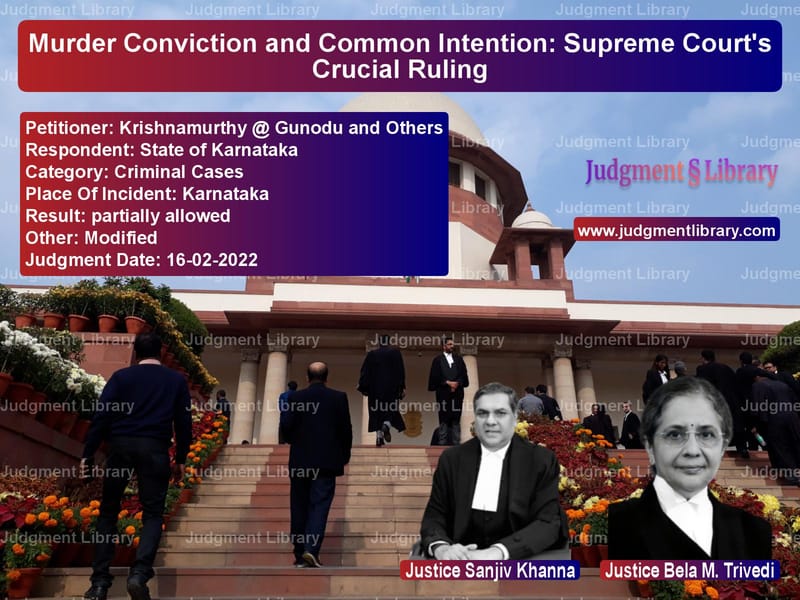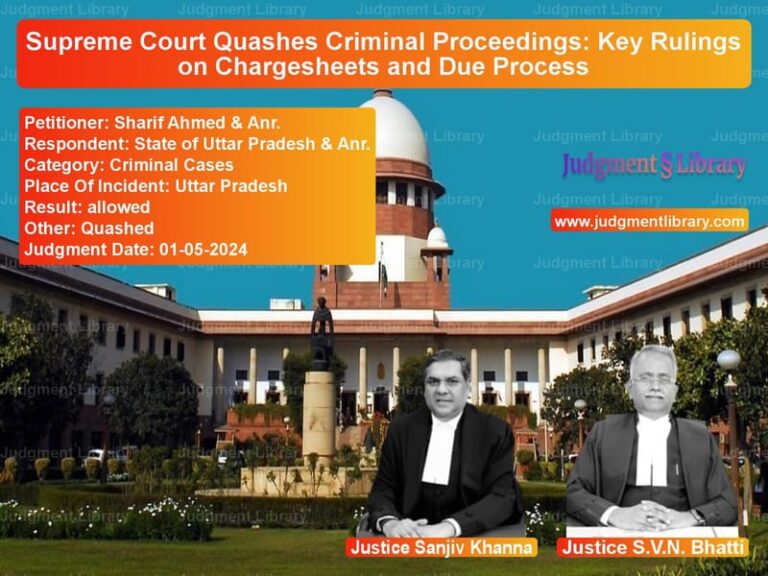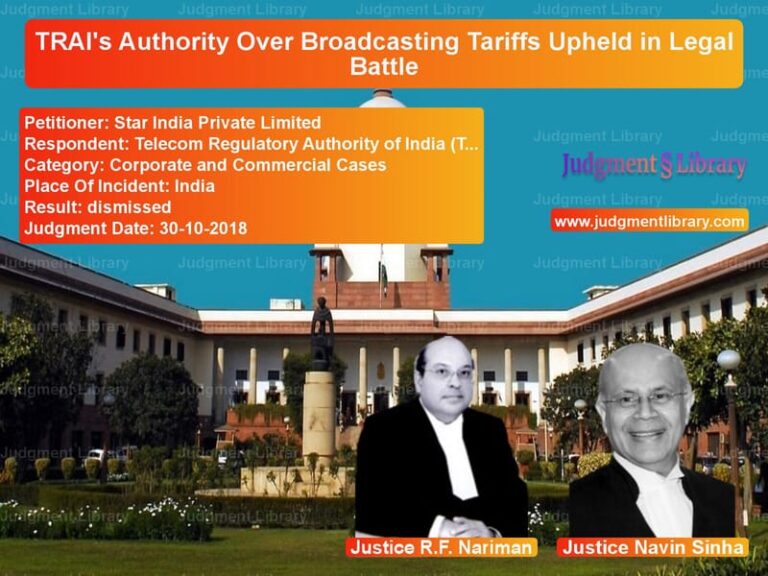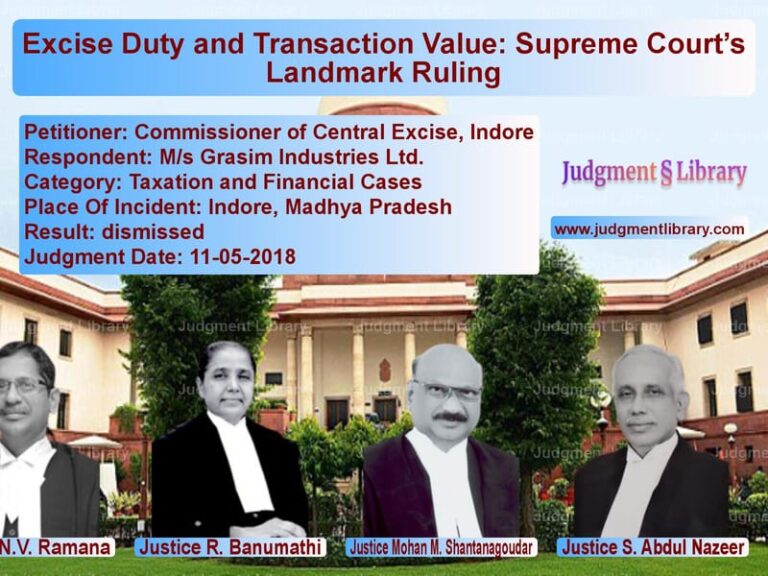Murder Conviction and Common Intention: Supreme Court’s Crucial Ruling
The Supreme Court’s decision in Krishnamurthy @ Gunodu and Others vs. State of Karnataka addresses the complex legal principle of common intention under Section 34 of the Indian Penal Code (IPC). The case involves the brutal murder of a man named Venkatarama, where three accused individuals—Krishnamurthy, Gopala, and Thimmappa—were charged under Section 302 (murder) read with Section 34 IPC, along with additional offenses under Sections 447, 504, 506, and 341 of the IPC.
The Court’s ruling provides critical insights into the application of common intention, the distinction between individual liability and joint liability, and the standards required to convict a person under Section 34 IPC. This case clarifies the necessity of proving shared intent and participation in a crime before holding multiple accused liable for the same offense.
Case Background
The case originated in Karnataka, where the deceased, Venkatarama, was attacked by the appellants. According to the prosecution, the accused were involved in a premeditated attack that resulted in severe injuries to the victim, leading to his death. The lower courts, including the High Court of Karnataka, found all three accused guilty of murder and sentenced them to life imprisonment.
The accused, however, challenged their convictions in the Supreme Court, arguing that the principle of common intention was wrongly applied and that the roles of each individual in the crime had not been correctly assessed.
Arguments of the Parties
Petitioner’s Arguments (Appellants)
- The appellants contended that there was no common intention among them to commit murder.
- They argued that while they were present at the scene, they did not all participate in the fatal assault.
- They claimed that only Krishnamurthy assaulted the victim after he had fallen, while Gopala and Thimmappa had merely held the victim.
- The appellants further argued that the High Court had erroneously applied Section 34 IPC without establishing a premeditated plan.
- They sought relief based on the acquittal of a juvenile co-accused in a separate trial.
Respondent’s Arguments (State of Karnataka)
- The prosecution maintained that all three accused acted with a shared intent to kill the victim.
- They argued that the accused held the victim down, allowing Krishnamurthy to deliver fatal blows.
- The injuries sustained by the victim, including fractures and hemorrhagic shock, indicated a deliberate and brutal attack.
- The respondent insisted that the common intention was evident from the sequence of events and the coordinated actions of the accused.
Supreme Court’s Analysis
1. Establishing Common Intention under Section 34 IPC
The Court reiterated that for Section 34 IPC to apply, there must be a common intention among the accused to commit the crime. This intention can be pre-arranged or formed at the spur of the moment.
“To attract applicability of Section 34 IPC, the prosecution is under an obligation to establish that there existed a common intention before a person can be vicariously convicted for the criminal act of another. The ultimate act should be done in furtherance of common intention.”
The Court emphasized that merely being present at the crime scene does not make an accused liable unless there is clear participation in the act.
2. Individual Acts vs. Joint Criminal Responsibility
The Supreme Court examined the specific roles of the accused:
- Krishnamurthy was identified as the main assailant who repeatedly kicked and stomped on the victim, causing fatal injuries.
- Gopala and Thimmappa were found to have held the victim, but they did not participate in the subsequent assault.
- Eyewitness accounts suggested that after holding the victim, Gopala and Thimmappa stepped back and did not assist in the fatal attack.
The Court held that merely restraining the victim was insufficient to establish that Gopala and Thimmappa shared Krishnamurthy’s intent to kill.
3. Modification of Convictions
Based on the evidence, the Supreme Court ruled:
- Krishnamurthy’s conviction under Section 302 IPC was upheld, but the stipulation that his life imprisonment would extend till his natural death was removed.
- Gopala and Thimmappa’s convictions under Section 302 IPC read with Section 34 IPC were set aside.
- Instead, Gopala and Thimmappa were convicted under Section 323 IPC (voluntarily causing hurt) and sentenced to one year in prison.
The Court reasoned that their actions did not amount to participation in the murder but could be classified as causing hurt.
4. Acquittal of Juvenile Co-Accused
The appellants argued that they should also be acquitted because a juvenile co-accused had been acquitted in a separate trial. The Court rejected this argument, stating:
“We have decided this appeal based on the evidence adduced and led by the prosecution in the chargesheet in question. We cannot decide this appeal based on the evidence and material led by the prosecution in the proceedings against the juvenile ‘A’ which were independent and separate proceedings.”
Conclusion
The Supreme Court’s ruling is a landmark judgment clarifying the scope of common intention in criminal law. It reinforces that:
- Common intention must be established beyond doubt before convicting multiple accused under Section 34 IPC.
- Merely being present at the crime scene or restraining a victim does not automatically imply shared intent.
- Convictions should be based on individual roles and not assumptions of collective liability.
- Acquittals in separate trials cannot serve as grounds for acquittal in another case.
This ruling ensures that courts carefully analyze evidence before attributing collective criminal liability, thereby upholding the principles of justice and fairness in criminal proceedings.
Petitioner Name: Krishnamurthy @ Gunodu and Others.Respondent Name: State of Karnataka.Judgment By: Justice Sanjiv Khanna, Justice Bela M. Trivedi.Place Of Incident: Karnataka.Judgment Date: 16-02-2022.
Don’t miss out on the full details! Download the complete judgment in PDF format below and gain valuable insights instantly!
Download Judgment: krishnamurthy-@-guno-vs-state-of-karnataka-supreme-court-of-india-judgment-dated-16-02-2022.pdf
Directly Download Judgment: Directly download this Judgment
See all petitions in Murder Cases
See all petitions in Attempt to Murder Cases
See all petitions in Judgment by Sanjiv Khanna
See all petitions in Judgment by Bela M. Trivedi
See all petitions in partially allowed
See all petitions in Modified
See all petitions in supreme court of India judgments February 2022
See all petitions in 2022 judgments
See all posts in Criminal Cases Category
See all allowed petitions in Criminal Cases Category
See all Dismissed petitions in Criminal Cases Category
See all partially allowed petitions in Criminal Cases Category







